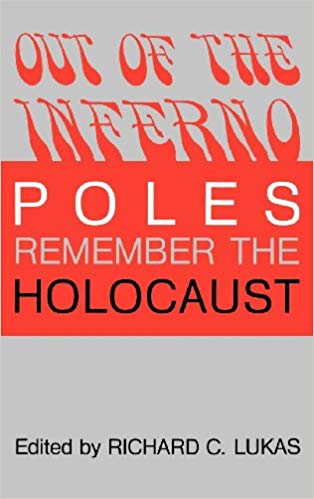Polonophobic Holocaust-Related Memes Answered Lukas

Out of the Inferno: Poles Remember the Holocaust, by Richard C. Lukas. 1989
A Book Degraded, By Some Jews, Because It Does Not Fit the Standard Narrative That Blames Everything on the Poles
Richard C. Lukas has provided a detailed anthology of Poles that had undergone the brutal German conquest and occupation of Poland during WWII. The reader of this book becomes immediately aware of the fact that not only Jews but also gentile Poles suffered constant humiliation, privation, torture and large-scale death in the hands of the German Nazi occupant. The testimony of Iwo Cyprian Pogonowski (pp. 139-142) is especially revealing in that it includes discussion of his experiences as an inmate of the Sachsenhausen concentration camp.
THE “POLES DID LITTLE TO HELP THE WARSAW GHETTO UPRISING” CANNED MEME
Henryk Wolinski (pp. 177-181) provides detail about his involvement in the aid of the Polish underground (AK) to Jews during their Warsaw Ghetto Uprising of April 1943. Wolinski soundly refutes charges that the AK did not provide more arms to the Jews because of anti-Semitic attitudes. He shows that the AK always had a severe shortage of arms, even a year later, when it came out in open warfare against the Germans.
JEWISH GESTAPO AGENTS
This book includes mention of seldom-discussed factors tending to limit Polish aid to fugitive Jews. This not only includes the German-imposed death penalty for the slightest Polish assistance to Jews, but also the danger of fugitive Jews denouncing both would-be Polish rescuers and other Jews currently being hidden (Jackowski, p. 77; Kierszniewski, p. 90).
POLES BASHED FOR (WHAT ELSE?) ANTISEMITISM
The careful (or even cursory) reader of this book can easily see that it has been egregiously misrepresented by the Publisher’s Weekly review. The claim that prewar and interwar Polish anti-Semitism had been ignored can be dispelled just looking in the index (p. 194) which shows it discussed in no less than ten pages! The claim that prewar Polish Jews experienced “daily brutality and prejudice” is just a little bit exaggerated. Based on direct personal experience, Januszewski (p. 79) points out that, while anti-Semitic legislation and incidents definitely occurred, most Poles got along well with Jews. He is of the opinion that prewar Polish anti-Semitism had been exaggerated. Wolinski, widely respected in both Polish and Jewish circles, is of the opinion that Polish anti-Semitism tended to die down in the face of common misfortunes caused the German occupant (p. 178).
Of course, when they occurred, Polish-Jewish prejudices had been mutual, as candidly admitted by one Jewish scholar cited by Lukas (p. 9). Elsewhere, the Dubiks (p. 64) suggest that Polish anti-Semitism had been fueled by the prewar Jewish dominance of commerce and the postwar Jewish over-representation in the hated Communist police establishment. Jackowski (p. 76) suggests that Polish anti-Semitism had been much stronger in eastern than in central Poland owing to the large number of Jews who had collaborated with the invading Soviet Communist forces (the Zydokomuna). In fact, Czelny (p. 40) provides an eyewitness account of a group of Jewish militiamen guarding a group of Polish soldiers who had been disarmed by the invading Soviet armies.
MORE FRIVOLOUS ACCUSATIONS AGAINST THE AUTHOR
The Publisher’s Weekly review insinuates that Lukas was expressing an anti-Semitic opinion for suggesting that Jews were largely passive during the Holocaust itself. What then, ISN’T anti-Semitism? As a matter of fact, Jewish passivity has been discussed by numerous authors, including Jewish ones. For instance, the eminent Jewish psychiatrist, Bruno Bettelheim, cited by Lukas (p. 11), came out strongly against Jewish passivity. Does this make Bettelheim an anti-Semite in spite of himself? Furthermore, none of the authors of this volume presents Jewish passivity in any sort of pejorative manner other than perhaps the fact that most Jews seemed to be in denial about what was happening to them for a long time. Martin (pp. 117-118) discusses her experiences with Jews in this regard. Also, for a long time, Jews had tended to think of Germans as a cultured people (p. 47) for whom acts of genocide would be unimaginable. The Poles, in contrast, knew immediately what the Germans had in store for them, as Poland had been the recipient of German aggression for at least the last thousand years. For this reason alone, Poles were more prone, than the Jews, to be discerning about the Germans.
To see a series of truncated reviews in a Category click on that Category:
- All reviews
- Anti-Christian Tendencies
- Anti-Polish Trends
- Censorship on Poles and Jews
- Communization of Poland
- Cultural Marxism
- German Guilt Dilution
- Holocaust Industry
- Interwar Polish-Jewish Relations
- Jewish Collaboration
- Jewish Economic Dominance
- Jews Antagonize Poland
- Jews Not Faultless
- Jews' Holocaust Dominates
- Jews' Holocaust Non-Special
- Nazi Crimes and Communist Crimes Were Equal
- Opinion-Forming Anti-Polonism
- Pogrom Mongering
- Poland in World War II
- Polish Jew-Rescue Ingratitude
- Polish Nationalism
- Polish Non-Complicity
- Polish-Ukrainian Relations
- Polokaust
- Premodern Poland
- Recent Polish-Jewish Relations
- The Decadent West
- The Jew as Other
- Understanding Nazi Germany
- Why Jews a "Problem"
- Zydokomuna